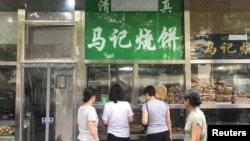Chinese officials have ordered Muslim food sellers in Beijing to remove words and images connected to Islam from their business signs.
Workers at 11 restaurants in the Chinese capital spoke to Reuters reporters. They said officials told them to remove images such as the crescent moon and words such as “halal” written in Arabic.
About 20 million Muslims live in China.
The campaign against Arabic writing and traditional Islamic images is part of an effort to make religions conform to traditional Chinese culture. The campaign has also included the removal of Middle Eastern-style elements on mosques across the country.
Islam is not the only targeted religion. In recent years, officials also have closed or destroyed Christian churches that operate without government permission.
But Muslims in China have been especially affected. In 2009, deadly fighting broke out between mostly Muslim Uyghur people and Han Chinese in Xinjiang. The area, in the country’s northwest, is home to about 11 million Uyghurs.
Over the next five years, ethnic Uyghurs were blamed for a series of knife and bomb attacks in public areas.
In answer, China launched what it described as a crackdown on terrorism in Xinjiang. It built huge, heavily guarded complexes across the region. China describes the complexes as voluntary work training centers. But former detainees describe the conditions inside as prison-like.
Rights groups and international experts estimate that China has detained between 1 and 3 million Muslims in Xinjiang since 2017.
The government says its actions are necessary to end religious extremism.
Observers say the ruling Communist Party is concerned that foreign influences can make religious groups difficult to control.
Darren Byler is a social scientist and Xinjiang expert at the University of Washington. He told Reuters, “Arabic is seen as a foreign language and knowledge of it is now seen as something outside of the control of the state.”
Byler added that China wants Islam in China to “operate primarily through Chinese language.”
Beijing is home to at least 1,000 halal food stores and restaurants. That number comes from the Meituan Dianping food delivery app. The stores are spread across the city’s historic Muslim neighborhood and other places.
It was not clear if every halal restaurant in Beijing had been told to remove or hide Arabic writing and Islamic images. Several bigger food businesses that Reuters reporters visited had already replaced their signs with the Chinese term for halal – “qing zhen.” Others had simply hidden the Arabic and Islamic images.
The Beijing government’s Committee on Ethnicity and Religious issues did not answer reporters’ questions. It only said the order was a national directive.
The National Ethnic Affairs Commission did not answer a request for comment.
Most store owners who spoke with Reuters said they did not mind replacing their signs. But some said it has led to questions from their customers. And, one employee at a halal meat store accused officials of “erasing” Muslim culture.”
The employee said, “They are always talking about national unity, they’re always talking about China being international. Is this national unity?”
I’m Ashley Thompson.
The Reuters news agency reported this story. Ashley Thompson adapted it for VOA Learning English. Caty Weaver was the editor.
________________________________________________________________
Words in This Story
crescent - n. a shape that is curved, wide at its center, and pointed at its two ends like a crescent moon. The image is often used in Islam.
halal - adj. accepted by Muslim law as fit for eating
mosque - n. a building that is used for Muslim religious services
church - n. a building that is used for Christian religious services
crackdown - n. an increased effort to enforce a law or rule
primarily - adv. used to express the main purpose of something or reason for something
delivery - n. the act of taking something to a person or place
replace - v. to be used instead of (something)
erase - v. to remove any thought or memory of (something)





